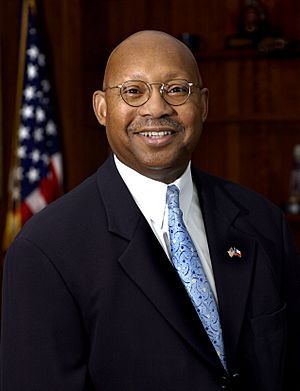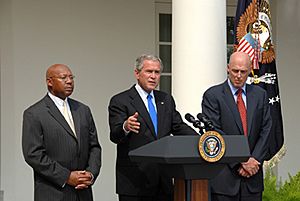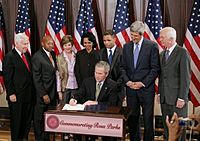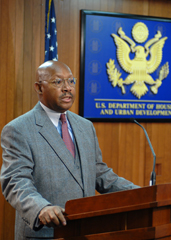Alphonso Jackson facts for kids
Quick facts for kids
Alphonso Jackson
|
|
|---|---|

Official portrait, 2005
|
|
| 13th United States Secretary of Housing and Urban Development | |
| In office August 31, 2004 – April 18, 2008 |
|
| President | George W. Bush |
| Deputy | Roy Bernardi |
| Preceded by | Mel Martínez |
| Succeeded by | Steve Preston |
| 5th United States Deputy Secretary of Housing and Urban Development | |
| In office May 24, 2001 – August 31, 2004 |
|
| President | George W. Bush |
| Preceded by | Saul N. Ramirez Jr. |
| Succeeded by | Roy Bernardi |
| Personal details | |
| Born | September 9, 1945 Marshall, Texas, U.S. |
| Political party | Republican |
| Spouse | Marcia |
| Children | 2 |
| Education | Truman State University (BA) Washington University in St. Louis (JD) |
Alphonso R. Jackson (born September 9, 1945) is an American politician. He served as the 13th United States Secretary of Housing and Urban Development (HUD) from 2004 to 2008. President George W. Bush chose him for this important role. The Senate approved his nomination in August 2004.
Contents
Early Life and Education
Alphonso Jackson was born on September 9, 1945, in Marshall, Texas. He grew up in South Dallas as the youngest of 12 children. His mother was a midwife. His father often worked three jobs to support the family.
Learning and College
Jackson attended Truman State University. There, he studied political science, which is about how governments work. He earned a master's degree in education administration in 1969. Instead of teaching, he decided to study law at the Washington University School of Law in St. Louis.
In March 1965, when Jackson was a college freshman, he took part in the first civil rights march from Selma to Montgomery. This event became known as "Bloody Sunday".
Starting His Career
Jackson began his career as a professor at the University of Missouri – St. Louis. In 1977, he became the director of public safety for St. Louis. Four years later, he led the St. Louis Housing Authority until 1983. He then worked as a consultant and became more involved in politics. He worked for a U.S. Senate campaign. In 1987, he became the director of Public and Assisted Housing for Washington, D.C.
Helping Dallas Housing
In 1989, Jackson was chosen to lead the Housing Authority of the City of Dallas (DHA). He was the first African American to hold this position. The agency had faced problems, including lawsuits. During his seven years, Jackson helped fix issues at the DHA. He improved living conditions for people who needed housing assistance. He worked to make old public housing buildings safer and better. He also helped bring a supermarket to a struggling neighborhood in West Dallas.
Jackson's time in Dallas had challenges. In 1995, the DHA started a plan to help families move into different neighborhoods. This plan was part of a court order to end housing segregation. Some local homeowners did not agree with the plan.
Working in the Private Sector
In 1996, Jackson left public service. He joined Central Southwest Power, which is now American Electric Power. He became a vice president there. In 1998, he became president and chief operating officer of American Electric Power-Texas. He was in charge of the company's operations in South and West Texas.
Returning to Public Service
When George W. Bush became president, Jackson was a good candidate for a federal job. They had known each other since 1989. In 2001, Congress approved Jackson to be the deputy secretary of the Department of Housing and Urban Development (HUD). This made him the second-in-command at HUD, working under Secretary Mel Martínez.
Jackson became the Secretary of HUD in August 2004. He served in this role until he resigned in March 2008.
After his time as HUD Secretary, Jackson became a professor at Hampton University from 2008 to 2012. He directed the Center for Public Policy and Leadership there. This center helps connect university research to real-world problems. It was the first of its kind at a Historically Black University.
Current Work
In 2012, Jackson became a vice-chairman at JPMorgan Chase in New York City. He works in consumer and community banking.
Important Roles and Awards
Alphonso Jackson is an expert on public housing and city issues. He has served on many national and state groups. These include the General Services Commission of Texas, where he was chairman. He also served on the National Commission on America's Urban Families.
He has been a board member for organizations like the U.S. Chamber of Commerce and the United Way Campaign in Dallas. He currently serves on the United States Department of State Fulbright Foreign Scholarship Board. He is also on the boards of Howard University and the Ford's Theatre Society.
Jackson is a member of The Horatio Alger Association of Distinguished Americans. He is also part of the United States Institute of Peace International Advisory Council.
Awards and Honors
Jackson has received many awards for his work. These include:
- The Aspen Institute – Aspen Fellow
- The National Boys and Girls Clubs of America – Chairman's Award
- The National Academy of Achievement – Golden Plate Award
- American Family Life Assurance Company (AFLAC) – Lifetime Achievement Award
- The Jewish National Fund, New York – National Tree of Life Award
- Truman State University – Distinguished Alumni Award
- Washington University in St. Louis – Distinguished Alumni Award
In December 2017, Jackson was chosen for the Horatio Alger Award for 2018. The Horatio Alger Association of Distinguished Americans honors people who have overcome challenges to achieve success.
Honorary Degrees
Jackson has received honorary degrees from several universities, including:
- Benedict College
- Hampton University
- Harris-Stowe State University
- Hiram College
- Morehouse College
- North Carolina A&T State University
- Paine College
- Tuskegee University
- Texas College
- Texas Southern University
Leading HUD: Housing and Urban Development
Jackson first joined the Bush administration in June 2001. He was the deputy secretary and chief operating officer of the U.S. Department of Housing and Urban Development. As deputy secretary, he managed HUD's daily operations and its large budget. After HUD Secretary Mel Martínez left, Jackson became the acting secretary. President George W. Bush nominated him to be the permanent secretary in August 2004. The Senate approved him quickly. Jackson was the fourth African American to hold this position. He announced his resignation on March 31, 2008.
Improving HUD's Operations
During Jackson's time, the Government Accountability Office (GAO) removed HUD from the government's "high-risk" list. This was the first time in 13 years. The GAO recognized HUD's progress under Jackson's leadership. He helped improve how HUD departments and programs were managed.
Jackson said that HUD works best when its programs are effective and efficient. He noted that removing the "high-risk" label showed their efforts to use taxpayer money wisely.
Reducing Homelessness
Under Jackson, HUD announced a big reduction in the number of people who were chronically homeless. This means people who have been homeless for a long time. Over 1,500 cities and counties reported fewer chronically homeless people between 2005 and 2006.
A key tool for this was HUD's first Annual Homeless Assessment Report to Congress. This report helped HUD learn a lot about homelessness. Before this report, it was hard for HUD to know if programs were working or where homeless people were.
Increasing Business Opportunities
Jackson worked to increase contracts for businesses owned by minorities, women, and small businesses. In 2003, before he became secretary, about 14 percent of HUD's contracts went to Black-owned firms. By 2007, this increased to 25 percent. Jackson believed that supporting small and minority businesses helps build a stronger America.
Working with Local Housing Agencies
Jackson's work with local housing agencies sometimes drew attention.
Philadelphia Housing Authority
In 2008, there were reports about emails between HUD officials. These emails suggested that HUD leaders wanted to take action against the director of the Philadelphia Housing Authority (PHA). HUD said the PHA was not following rules about making housing accessible for people with disabilities. A federal judge later ruled that Jackson did not treat Philadelphia differently from other housing agencies. In October 2008, the PHA and HUD signed an agreement. The PHA agreed to upgrade many housing units for people with disabilities.
Government Contracts
In 2006, Jackson spoke about government contracts. He shared a story about a company that did not get a contract. He said the company's representative had criticized President Bush. Jackson explained that he believed it was logical not to reward someone who did not support the President.
After his comment, some called for an investigation. The investigation found no evidence that a contract was canceled because of this.
Media Appearances
Jackson has appeared in the media to discuss housing and financial topics:
- He worked with the Clinton Foundation and New York City on 'Green' Public Housing.
- He was interviewed on Fox News about the Real Estate Settlement Procedures Act (RESPA).
- He appeared on CNBC to discuss FHA loans.
- He was a speaker at the University of Miami in 2012, discussing "Workforce Housing in the New Economy."
- He spoke at the HOPE Global Financial Dignity Summit in Atlanta, GA, in 2013.
See Also
 | James B. Knighten |
 | Azellia White |
 | Willa Brown |




